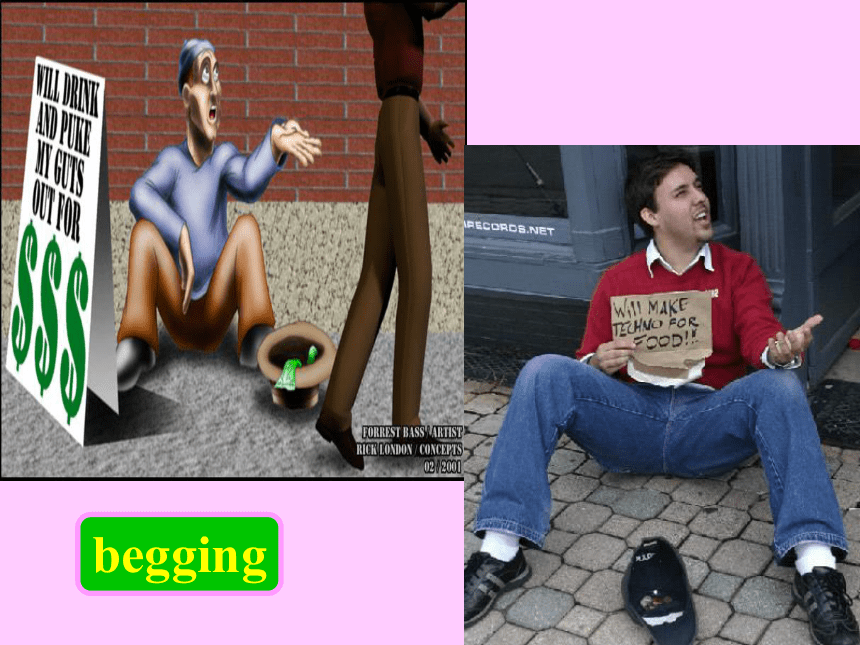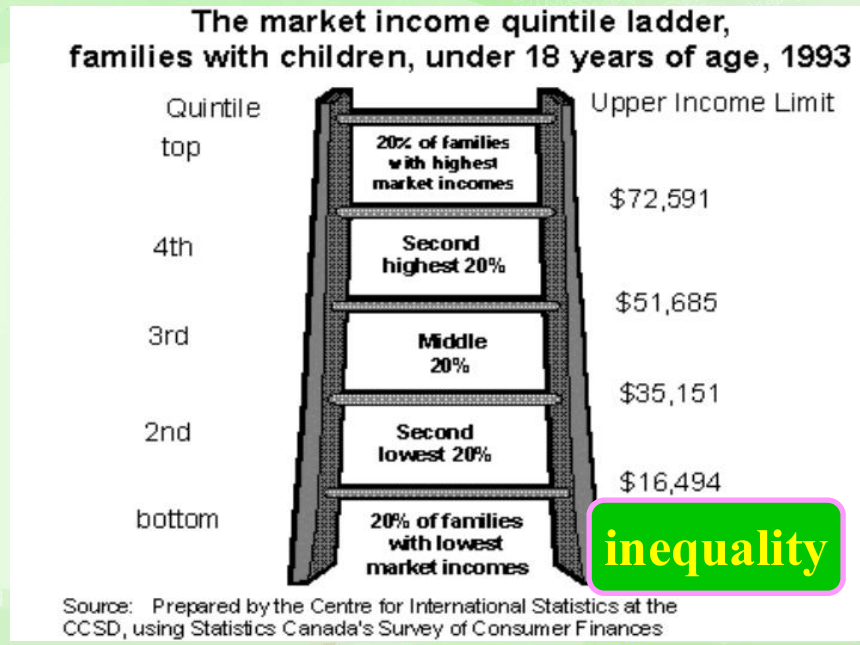Unit 24 Warm-up(安徽省安庆市岳西县)
文档属性
| 名称 | Unit 24 Warm-up(安徽省安庆市岳西县) |

|
|
| 格式 | rar | ||
| 文件大小 | 1.7MB | ||
| 资源类型 | 教案 | ||
| 版本资源 | 北师大版 | ||
| 科目 | 英语 | ||
| 更新时间 | 2008-07-10 00:00:00 | ||
图片预览









文档简介
课件21张PPT。Warm-UpIn this unit you will★ Discuss social issues, talk about society in the past and make suggestions.
★ Listen to a radio news report, a story, dialogues and a song.
★ Use listening strategies for dealing with cultural references. ★ Read magazine articles and letters to a newspaper. use reading strategies for summarising.
★ Write a discursive essay.
★ Learn about complex sentences used for persuasion.Warm-upWhat do you think are the biggest problems in Western countries?
Put them in order of importance.Exercise 1Key words: social problems beggingracial
discrimination.domestic
violencedrugsinequalityhomelessnesspovertyunemploymentViolent crimeExercise 2 Listen to the radio news report about changes in British society. Match the topics with the graphs below.Percent of households with cars
Percent of households with computers
Percent of women who work
Percent of 16-18 year olds in full-time educationPercent of households with cars
Percent of households with computers
Percent of women who work
Percent of 16-18 year olds in
full-time educationListen again and complete the table.average income £550men 7074women 7579less than
1 million550,0001,300,000280,000520,000Tape-script:
A recent report on British society has shown that most Britons live longer, are healthier, better educated and much richer than twenty years ago. However, we work longer hours and are much more worried about crime than ever before.
Our standard of living has risen and the average income of British families is now nearly £550 a week, compared with £326 in 1981, which is a considerable rise even when taking into account inflation. The percentage of households with cars has climbed from 62% to 72%, while the number with central heating has increased from 61% to 90%. The percentage of households with computers has rocketed dramatically from around 3% to over 40%.
Not everybody has benefited though and there are much greater inequalities than twenty years ago, thetop 20% are much richer – they now have 46% of the nations’ wealth compared with around 35% in 1981. the bottom 20% of society are now relatively much poorer and their share of the nations’ wealth has declined from 10% to 6%. Problems like begging and homelessness are on the increase.
Life expectancy has gone up steadily. In 1981, British men could expect to live around 70 years and British women on average 75 years. Now men live 74 years and women 79.
Over the last twenty years, unemployment has fluctuated but has gone down recently. It went up from around 1.7 million in 1981 to 2.1 million in 1989 only to fall beneath a million in the spring of 2001. However, we work much longer hours than before, in fact the longest in Europe. There are many more women working than before– nearly 72% comparedwith 57% in 1981, the highest figure in Europe. However, on average women still only earn 80% of that earned by men.
Britons are better educated than twenty years ago, at least in theory. Now nearly 60% of 16—18 year olds are in full-time education compared with 32% twenty years ago. The numbers of full0time students in further education has more than doubled, from 550,000 in 1981 to over 1,300,000 in 2001.
Possibly the most worrying trends are related to crime and violence. Between 1981 and 2001, the number of crimes in England and Wales almost doubled from 280,000 to 520,000. the amount of violent crime rose from 56,000 to 61,000, not such a big increase perhaps but a figure fifteen times higher than that of 1950. there has also been an increase in cases of domestic violence in the last few years. Work in pairs. Use the key words to say true or false sentences about trends in British society.Key Words: Describing Trends◇ to rise, to climb, to go up, to rocket,
to double triple, to be on the increase
◇ to fall, to go down, to decline,
to be on the decrease
◇ to fluctuate, to go up and downModern China (After the Reform & Opening)
Computer car mobile phone poverty
telly car crime death
★ Listen to a radio news report, a story, dialogues and a song.
★ Use listening strategies for dealing with cultural references. ★ Read magazine articles and letters to a newspaper. use reading strategies for summarising.
★ Write a discursive essay.
★ Learn about complex sentences used for persuasion.Warm-upWhat do you think are the biggest problems in Western countries?
Put them in order of importance.Exercise 1Key words: social problems beggingracial
discrimination.domestic
violencedrugsinequalityhomelessnesspovertyunemploymentViolent crimeExercise 2 Listen to the radio news report about changes in British society. Match the topics with the graphs below.Percent of households with cars
Percent of households with computers
Percent of women who work
Percent of 16-18 year olds in full-time educationPercent of households with cars
Percent of households with computers
Percent of women who work
Percent of 16-18 year olds in
full-time educationListen again and complete the table.average income £550men 7074women 7579less than
1 million550,0001,300,000280,000520,000Tape-script:
A recent report on British society has shown that most Britons live longer, are healthier, better educated and much richer than twenty years ago. However, we work longer hours and are much more worried about crime than ever before.
Our standard of living has risen and the average income of British families is now nearly £550 a week, compared with £326 in 1981, which is a considerable rise even when taking into account inflation. The percentage of households with cars has climbed from 62% to 72%, while the number with central heating has increased from 61% to 90%. The percentage of households with computers has rocketed dramatically from around 3% to over 40%.
Not everybody has benefited though and there are much greater inequalities than twenty years ago, thetop 20% are much richer – they now have 46% of the nations’ wealth compared with around 35% in 1981. the bottom 20% of society are now relatively much poorer and their share of the nations’ wealth has declined from 10% to 6%. Problems like begging and homelessness are on the increase.
Life expectancy has gone up steadily. In 1981, British men could expect to live around 70 years and British women on average 75 years. Now men live 74 years and women 79.
Over the last twenty years, unemployment has fluctuated but has gone down recently. It went up from around 1.7 million in 1981 to 2.1 million in 1989 only to fall beneath a million in the spring of 2001. However, we work much longer hours than before, in fact the longest in Europe. There are many more women working than before– nearly 72% comparedwith 57% in 1981, the highest figure in Europe. However, on average women still only earn 80% of that earned by men.
Britons are better educated than twenty years ago, at least in theory. Now nearly 60% of 16—18 year olds are in full-time education compared with 32% twenty years ago. The numbers of full0time students in further education has more than doubled, from 550,000 in 1981 to over 1,300,000 in 2001.
Possibly the most worrying trends are related to crime and violence. Between 1981 and 2001, the number of crimes in England and Wales almost doubled from 280,000 to 520,000. the amount of violent crime rose from 56,000 to 61,000, not such a big increase perhaps but a figure fifteen times higher than that of 1950. there has also been an increase in cases of domestic violence in the last few years. Work in pairs. Use the key words to say true or false sentences about trends in British society.Key Words: Describing Trends◇ to rise, to climb, to go up, to rocket,
to double triple, to be on the increase
◇ to fall, to go down, to decline,
to be on the decrease
◇ to fluctuate, to go up and downModern China (After the Reform & Opening)
Computer car mobile phone poverty
telly car crime death
